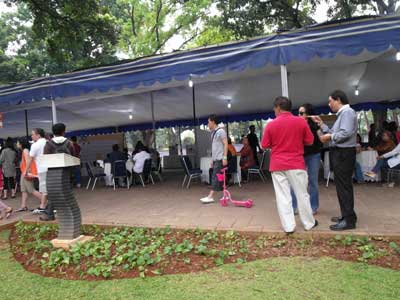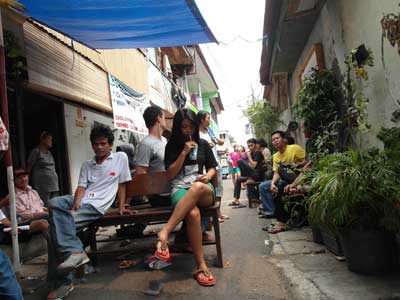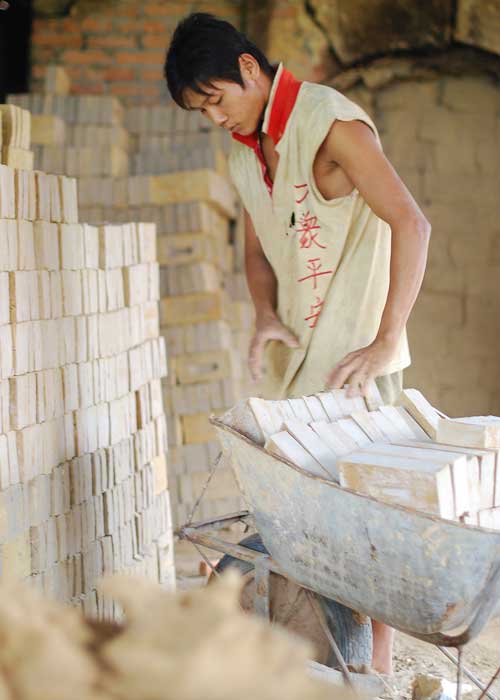 |  |
I arrived back in Indonesia just in time to see Jakarta vote for its Governor. It’s not a small job, wrestling some sanity into a city that crushes nine million official souls into its alleys, backstreets and blossoming apartment complexes, swelling to nearly 18 million on work days. The election was hotly contested. I witnessed the voting first outside the official Governor’s residence, in rich and (relatively) leafy Menteng. Well-coiffed women in their high day and holiday batik knocked back free bottled water and fruit as they waited to vote in a polling station bedecked with top-lit satin. Then I went 15 minutes down the road to the tenements of Tanah Tinggi. There, plastic tarps kept the sun off the ballot boxes, and people slopped around in T-shirts and sandals, waiting to hear their city’s fate.
The second-round fight was between the incumbent governor Fauzi Bowo (Foke to his friends) and the mayor of the central Java town of Solo Joko Widodo (aka Jokowi). The latter was paired with Ahok, an ethnic Chinese politician from the Western Indonesian island of Belitung. Both of the challengers are known for their pro-poor policies. Yet as I wandered the grubby, syringe-strewn alleys of Tanah Tinggi, I found hostility for the new-comers, support for the incumbent. What has Foke (a senior official in the Jakarta administration for nearly two decades and mayor for the last five years) done for you? I ask a woman who is bathing her child in the central gutter between two overcrowded tenements. “Ya, OK, not much. But we can’t let the Chinese take over our city”. In the nail-biting vote count I witnessed in Polling Station 12, Tanah Tinggi, Jokowi won by just 3 votes, 98 to 95; elsewhere in Tanah Tinggi Foke won handily. In TPS 24 in Menteng, outside Foke’s house, Jokowi crushed the incumbent by 226 votes to 59. The rich, who don’t need more than they have, vote for change. The city’s poorest have low expectations; it now seems they’d rather stay poor than take a punt on someone who will team up with the “Chinese”. It’s a mark of the maturity of Jakarta’s electorate that so few of its members were swayed by the nakedly Xenophobic campaigning of the Foke team.
I had cause to think of this again the other day as I wandered around Singkawang, a Chinese-majority city (maybe Indonesia’s ONLY Chinese-majority city) in West Kalimantan that happened to have elections on the same day. There, squabbling candidates managed to split the Chinese vote three ways, leaving the single indigenous Malay candidate, a Moslem, with the mayor’s post. Racial solidarity doesn’t go all that far, it seems. But nor do racial stereotypes. The assumption in much of Indonesia is that all ethnic Chinese Indonesians are business people who float near the top of any given town’s financial strata. In Singkawang, I floated in to a brick factory where men and women were stamping out clay bricks using simple wooden moulds. How much did they earn? Sixty rupiah per brick. And how many bricks could they make in a day? Oh, 300, said one woman proudly. Another woman shook her hair in disgust. “Me, I can make 400”. That puts these brick workers on something around two dollars a day, the same as the lepers of South Sulawesi earn, even though the bricks here are better quality and sell for 50% more. Every single one of the workers in the factory was ethnic Chinese.

Also a burgeoning sensitive issue in Timor-Lests. Sigh.
Even if Jokowi & Ahak will eventually disappoint their voters ( they probably will) there still will remain your hopeful observation “It’s a mark of the maturity of Jakarta’s electorate that so few of its members were swayed by the nakedly Xenophobic campaigning of the Foke team”.
As a foreigner who’s considered an outside obsevers, Indonesians routinely share with me their opinions about other religions and ethnic groups. According to the Balinese, the Javanese are all menial laborers who need to escape Java to make a living or violent Muslim fanatics. To the Muslims, the Balinese are filthy kaffirs who eat pig. Foreigners all are sex maniacs with no morals. The Chinese are out to steal Indonesia. It is really quite disgusting how generalized and engrained these attitudes are in your average Agus, Wayan and Anhar.
That is one good-looking bricklayer.